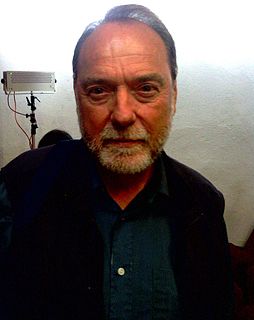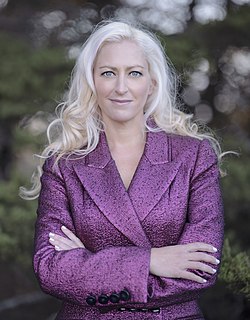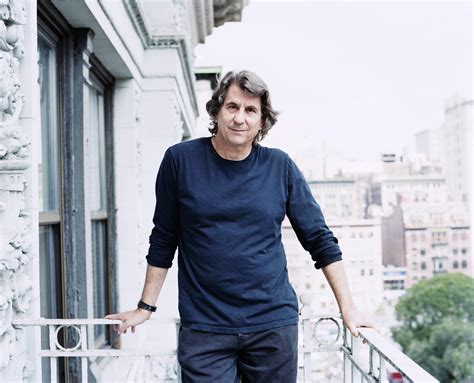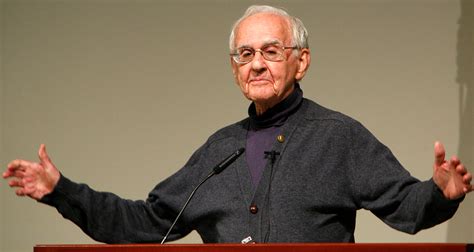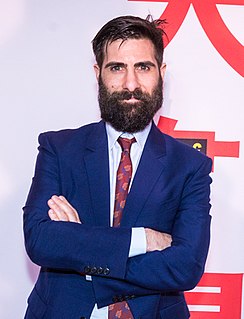Top 463 Environments Quotes & Sayings - Page 7
Explore popular Environments quotes.
Last updated on November 14, 2024.
We're not all equal as far as intelligence is concerned. We're not equal as far as size. We're not all equal as far as appearance. We do not all have the same opportunities. We're not born in the same environments, but we're all absolutely equal in having the opportunity to make the most of what we have and not comparing or worrying about what others have.
XL is dedicated to understanding shifting business dynamics and helping our clients thrive in increasingly complex and changing environments. 'The Future of the Company' platform will allow us to offer insights and commentary on these essential topics to a global and diverse audience and feature insights from XL experts.
When environments change, they usually do so pretty rapidly, at rates with which adaptation by natural selection would be hard put to keep up. When such change occurs, the quality of your adaptation to your old habitat is irrelevant, and any competitive advantage you might have had may be eliminated at a stroke.
We have to rethink the way we light our cities. We have to think again about light as a default solution. Why are all these motorways permanently lit? Is it really needed? Can we maybe be much more selective and create better environments that also benefit from darkness? Can we be more gentle with light?
In my mind, depression is, like all non-communicable diseases, a physiologically expressed condition which is profoundly influenced by our social and cultural environments. Depression is a global crisis not only because it is common and universal, but because the vast majority of affected people suffer in silence or receive inappropriate care.
There are definitely recurring themes in humanity's relationship with our environment. The biggest is probably adaptation, because humans are incredibly good at adapting to new environments in relatively short periods of time. The ancestors of Homo sapiens started leaving Africa over one million years ago, moving from warm, tropical climates into the freezing wilderness of Europe and the desert ecosystems of the Middle East.
We actually tried to put in [Kung Fu Panda 3] all the things we wanted to put into the first two films. We're all the same people who've been working on the other films and we all had things we couldn't do, and had to leave on the table. We just couldn't achieve them before. This time we have multiple new environments and different styles of animation.
Some kids win the lottery at birth; far too many don't - and most people have a hard time catching up over the rest of their lives. Children raised in disadvantaged environments are not only much less likely to succeed in school or in society, but they are also much less likely to be healthy adults.
While the Tan Yan Kee foundation believes that it is merely scratching the surface relative to the gargantuan problems in the education sector, it envisions that one day it will be able to train more teachers and provide much-needed facilities that will transform schools into more conducive learning environments.
We all must be mindful that the United States has diplomatic, civilian, and military personnel deployed in other countries with both challenging security environments and active terrorist networks interested in targeting not just our facilities but our people. One of their greatest protections - knowing that the United States does not negotiate with terrorists - has been compromised.
For a lot of people, 'Dungeons & Dragons' has been a hard thing to describe. I can't tell you how many social environments I've been in where I say, 'I play 'D&D,'' and a bunch of normies will be like, 'How does the game even work? What's that like?' I didn't have anything to really describe it that didn't make me sound like a crazy person.
The real world just doesn’t offer up as easily the carefully designed pleasures, the thrilling challenges, and the powerful social bonding afforded by virtual environments. Reality doesn’t motivate us as effectively. Reality isn’t engineered to maximize our potential. Reality wasn’t designed from the bottom up to make us happy.
I am talking about ordinary people making the link between their communities being treated as disposable and the assumption that the environments they depend on are disposable as well. What gives me hope is the kind of bridgework I'm seeing between social movements on the one hand, and young writers and artists on the other, all intent on opposing such pitiless, short-term thinking.
I have never worked for fame or praise, and shall not feel their loss as I otherwise would. I have never for a moment lost sight of the humble life I was born to, its small environments, and the consequently little right I had to expect much of myself, and shall have the less to censure, or upbraid myself with for the failures I must see myself make.
Playing Japanese characters and being in environments that are Japanese, like a character's apartment or whatever, if you have directors or art directors who just don't know what' s what with Japanese culture, then pretty soon something's just passed through. I've been through many times where I've pointed out the incorrectness of so much of what's been done to a set.
Life has evolved to thrive in environments that are extreme only by our limited human standards: in the boiling battery acid of Yellowstone hot springs, in the cracks of permanent ice sheets, in the cooling waters of nuclear reactors, miles beneath the Earth's crust, in pure salt crystals, and inside the rocks of the dry valleys of Antarctica.
The color and spectacle of Mexico's streets sparked my interest in community driven space and experience, a passion that I began to develop while studying architecture at Syracuse University and then at the Architectural Association School in London. Having been immersed in such a diverse array of lively environments, it would be impossible for me not to use these memories and experiences as inspiration for my work.
Somehow, the agenda has been put into the form of talking about a set of transitions from state A, the present, to a state B that's sustainable. The problem is that there is no such state. You have to assume that the transitions are going to continue forever and ever and ever. You have to talk about systems that are continuously dynamic, and that are embedded in environments that themselves are continuously dynamic.
The important thing to understand about eliminating racial preferences in college admissions is that doing so does not lower the number of minority college students, it just redistributes them to schools for which they are actually qualified, rather than catapulting them into academic environments where they will inevitably struggle.
It must be acknowledged that an increasing proportion of the world's population is living in cities, in almost completely human-made environments. But we should also acknowledge that there are still a considerable number of people who wish to live in harmony with nature, and that globalization has made their ways of life increasing difficult to sustain.
People live and work in uninspiring environments, but look inside those rooms. Look at the painted walls and the decorations. People rebel even in the most controlled office environment in which they're not allowed to do anything. You see the little bulletin board in front of a person's desk with their photos, clippings, cartoons and whatever else.
No matter how much you urge them to relax and how much you mean it, your child probably grapples with highly stressful environments away from home, whether it's where they go to school, the teams they play on, or the peers in their social circle. Most teenagers I know long for empathy from their parents about their struggle.
It's not that there is no small talk...It's that it comes not at the beginning of conversations but at the end...Sensitive people...'enjoy small talk only after they've gone deep' says Strickland. 'When sensitive people are in environments that nurture their authenticity, they laugh and chitchat just as much as anyone else.
We should not knowingly allow any species or race to go extinct. And let us go beyond mere salvage to begin the restoration of natural environments, in order to enlarge wild populations and stanch the hemorrhaging of biological wealth. There can be no purpose more enspiriting than to begin the age of restoration, reweaving the wondrous diversity of life that still surrounds us.
I don't even know of a room that doesn't have a flat-screen TV in it. These are things that just come in environments these days. And if you were going to walk into a space, where did you come from? Was there a bathroom around the corner? These are things that are authentic, and that's what makes successful television. It's not pre-produced garbage. It's believability and connection. The environment has to tell that story.
If I come in, and you're an employer, and I say, 'Well, I was a sniper in the Marine Corps. Do you have any sniper positions open?' 'No.' But if I told you that I was good at communication, good at leadership under stressful environments, team management, personnel management, leadership, being prompt, are stuff that I can bring to the table.
It's not uncommon to hear people say that the re-entry into their lives is very hard. A lot of actors say that the hardest thing about working is not working, because you go from one of the most structured environments in the world to a place of no structure. Maybe that's why you see someone go from movie to movie to movie.
The mistake isn't releasing something bad. The mistake is to launch it and get PR people involved. You don't want people to start amping up expectations for an early version of your product. The best entrepreneurship happens in low-stakes environments where no one is paying attention, like Mark Zuckerberg's dorm room at Harvard.
At least 90 percent of my work is in situ. For me, it's not only to work with the architecture and space, it's also to work with the time, to work with the people who are involved with the place. It's also dealing with history. It takes all this into account. Other works can be placed in different environments, but they always follow a rule. This is usually not the case for work in situ, because even if they are transported, they remain there forever or they are destroyed.
When we can commit a crime, we can also trigger debate. Cases go to courts. Media start covering the cases. But once you build smart environments where, if you meet a certain probabilistic profile, you won't even be allowed to board a bus, let alone commit a crime, we're perpetuating existing laws so they face no challenges or revision.
We will have to make a decision, as we go into new environments outside of earth, whether we want to drag along with us all our pathogens. We can, or we can't - it's up to us - but I consider that part of genome engineering is how we interact with the huge part of our genome which is our microbiome.
Children are truly the future of this country - our next teachers, they're our next doctors, they're our next police officers, and they're our next Members of Congress. It's our responsibility to do everything that we can to protect them and make sure that children are able to live, learn, and grow up in safe environments.
Don't put down too many roots in terms of a domicile. I have lived in four countries and I think my life as a writer and our family's life have been enriched by this. I think a writer has to experience new environments. There is that adage: No man can really succeed if he doesn't move away from where he was born. I believe it is particularly true for the writer.
Whenever you move to a new atmosphere, the first few days are difficult. But I always felt that an actor needs to move out of his comfort zone and experience different working environments. And that's why I was looking at moving out of my own comfort zones and work with different kinds of people. It helps you grow as an actor.
Nothing is more important for transgender people than to have access to excellent health care in trans-affirmative environments, to have the legal and institutional freedom to pursue their own lives as they wish, and to have their freedom and desire affirmed by the rest of the world. This will happen only when transphobia is overcome at the level of individual attitudes and prejudices and in larger institutions of education, law, health care, and kinship.
war with poison and chemicals was not so rare in the ancient world ... An astounding panoply of toxic substances, venomous creatures, poison plants, animals and insects, deleterious environments, virulent pathogens, infectious agents, noxious gases, and combustible chemicals were marshalled to defeat foes - and panoply is an apt term here, because it is the ancient Greek word for 'all weapons.
I think that's an important part of art in general. Especially in literature, in stories, we play with eventualities that may put us through a lot of intense negative feelings - say, in horror films or tragedies as intense as King Lear - but we come out feeling richer. We've lived to the fullest, we've tested ourselves in these environments.
I feel good about the fact that I finally found something I love. I never lived in one place for very long - that's the way my whole life has been. I was always packing and moving around, staying in Canada, Kentucky, Jersey, St. Louis - it all helped because I was always learning new accents, experiencing different environments.
Im interested in the liberating aspect of being totally untethered, let loose in the worst possible environments. My favorite artists are always women that do things that are so wrong... I like things to be seven kinds of wrong. If they are seven kinds of wrong, sometimes the wrongs neutralize themselves, and the whole thing becomes.
One code prevails in the family; another, on the street; a third, in the workshop or store; a fourth, in the religious association. As a person passes from one of the environments to another, he is subjected to antagonistic pulls, and is in danger of being split into a being having different standards of judgment and emotion for different occasions. This danger imposes upon the school a steadying and integrating office.
I love reading different scripts and helping create different looks, different environments. Sometimes you go to meet a director over a particular script, and they'll say, 'I want you to do this because I want it to look like Shawshank,' and I'm like, 'Well, I'm not that interested in doing that again.'
If [the Conservatives] lose, we say, "Okay, we gotta change. We gotta improve, come back and win the next election." They [leftists] don't. When they lose and even when they win, because they know that they're in a numerical minority. But that numerical minority is a vast majority of pop culture and education environments. And so they just bully their way.
… what society overwhelmingly asks for is snake oil. Of course, the snake oil has the most impressive names — otherwise you would be selling nothing — like “Structured Analysis and Design”, “Software Engineering”, “Maturity Models”, “Management Information Systems”, “Integrated Project Support Environments” “Object Orientation” and “Business Process Re-engineering”.
I don't ever want to do a movie where you shoot it on a motion capture stage. I just don't like taking the reality out of it. I like being on the set in real environments. I don't like shooting on green screen. I think it gives the actors so much more to play with when there's real stuff happening on the set.
The trade-off between speed and image quality is a key constraint of first-person action games, and the job of developing a workable engine involves constantly optimizing both elements. Gamers dream of the day they'll be able to haul their arsenals through three-dimensional environments of photographic clarity, playing 'Myst' with a meat ax.
The part of the brain most affected by early stress is the prefrontal cortex, which is critical in self-regulatory activities of all kinds, both emotional and cognitive. As a result, children who grow up in stressful environments generally find it harder to concentrate, harder to sit still, harder to rebound from disappointments, and harder to follow directions. And that has a direct effect on their performance in school.
This is a unique aquarium in that a large portion of its collection features freshwater species, and it specializes in fish, amphibians and reptiles from the southwestern part of the country. The River Journey exhibit transports visitors from the Appalachian highlands through ponds, rivers and swamps, all the way to the seacoast. The recently added Ocean Journey exhibit allows visitors to sample a variety of saltwater environments.
Technology allows us to weed out a lot of the extraneous circumstances that can happen in certain environments. If you have an opportunity to say, "I'm going to be in charge of my own narrative. I'm going to be the one who sees that this is OK for me," like anything else, it just gives you a position of feeling like you can be in charge of those things.
The religious urge in man is not a mere passing phase in the history of his spiritual development, but the ultimate source of all his ethical thought and all his concepts of morality; not the outcome of primitive credulity which a more "enlightened" age could outgrow, but the only answer to a real, basic need of man at all times and in all environments. In another word, it is an instinct.




